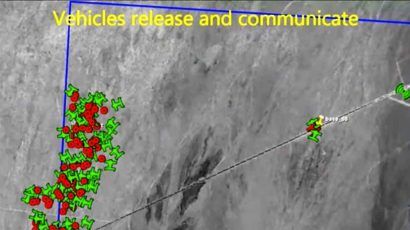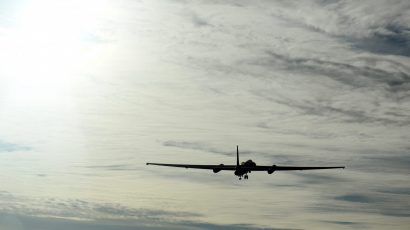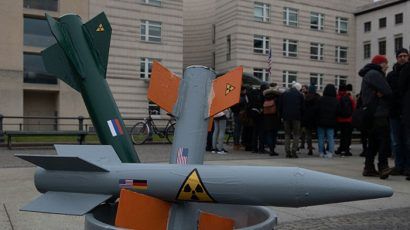Search results for autonomous weapon
What the Campaign to Stop Killer Robots can learn from the antinuclear weapons movement
What today's campaigners against the battlefield use of A.I.-powered autonomous robots can learn from the successful antinuclear movements of yesteryear.
When AI is in control, who’s to blame for military accidents?
As militaries incorporate AI into everything from surveillance systems to tank turrets, one thing is for certain: there will be accidents. But how will governments deal with the fallout from a military accident involving AI? Accidents will continue to happen, but if AI is making critical military decisions, who will be to blame?
Meet the future weapon of mass destruction, the drone swarm
Drone swarms are getting larger and, coupled with autonomous capability, they could pose a real threat. Think “Nagasaki” to get a sense of the death toll a massive drone swarm could theoretically inflict.
Regulating military AI will be difficult. Here’s a way forward
If the international community doesn’t properly manage the development, proliferation, and use of military AI, international peace and stability could be at stake
Beatrice Fihn explains why nuclear weapons are a scam
A year ago, a majority of the world’s countries—122 of them—voted to enact a treaty with the highly ambitious goal of abolishing nuclear weapons entirely. To the treaty’s critics, it wasn’t so much ambitious as foolish, counterproductive, or irrelevant. But proponents and critics alike can at least agree that it was unprecedented. While the community … Continued
“As much death as you want”: UC Berkeley’s Stuart Russell on “Slaughterbots”
If you never dreamed that toy-like drones from off the shelf at the big-box store could be converted—with a bit of artificial intelligence and a touch of shaped explosive—into face-recognizing assassins with a mission to terminate you—well, dream it.
Autonomous and unaccountable
Though this roundtable's participants agreed in Round One that autonomous weapons should be subject to international regulation, no one spent much time discussing how a regulatory system might be created. Perhaps that's because all three authors concentrated on points that—although difficult to disagree with—were nonetheless important to establish at the outset. Civilian safety should be … Continued
Collections
Collections In publication since 1945, the Bulletin of the Atomic Scientists has gathered the best science and scientific commentary on the serious human-made existential threats to our species and our planet. The collections below gather a selection of articles published by the Bulletin on subjects that remain critical to our understanding of these threats — from … Continued
An ambitious arms control agenda requires a new organization equal to the task
An exceedingly challenging agenda of urgent, important, and diverse arms control issues awaits the incoming Biden administration. To address it, the administration should consider the creation of a new agency to focus on cooperative threat reduction.
Artificial intelligence and national security
From Harvard University's Belfer Center, this study of artificial intelligence and its likely security implications is an outstanding one-stop primer on the subject.
US killer robot policy: Full speed ahead
The Defense Department's policy for autonomy in weapon systems may appear to reflect caution, but it allows the Pentagon to fund, test, buy, and use technology that could target and kill by machine decision.
AI and the future of warfare: The troubling evidence from the US military
US military officers can approve the use of AI-enhanced military technologies that they don't trust. And that's a serious problem.
Distinguishing autonomous from automatic weapons
My roundtable colleagues Paulo E. Santos and Monika Chansoria both argue for regulating rather than banning autonomous weapons. But they never define precisely what they would regulate. This is a troublesome oversight—anyone arguing for regulation of weapons or their actions ought to have a very clear idea what regulation entails. Autonomous weapons, according to the … Continued
The best of the roundtables, 2015
A choice selection of pieces from our Deveopment and Disarmament Roundtable series
Current Time – 2024
A moment of historic danger: It is still 90 seconds to midnight 2024 Doomsday Clock Statement Science and Security Board Bulletin of the Atomic Scientists Editor, John Mecklin January 23, 2024 Founded in 1945 by Albert Einstein, J. Robert Oppenheimer, and University of Chicago scientists who helped develop the first atomic weapons in the Manhattan … Continued
Existential espionage: How intelligence gathering can protect humanity
Intelligence communities play an important role in analyzing, preventing, and leading efforts to minimize existential risks.
Who’ll want artificially intelligent weapons? ISIS, democracies, or autocracies?
If you’re a dictator who can’t trust your own people in the military, you can still trust a machine to do your dirty work.
The critical human element in the machine age of warfare
As multiple militaries have begun to use AI to enhance their capabilities on the battlefield, several deadly mistakes have shown the risks of automation and semi-autonomous systems, even when human operators are notionally in the loop.











